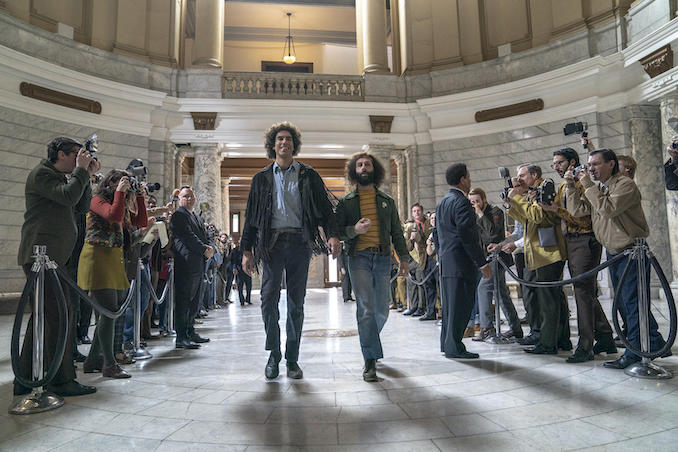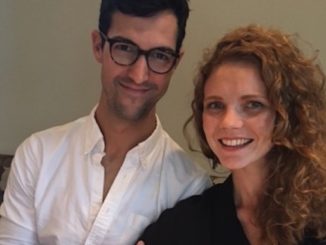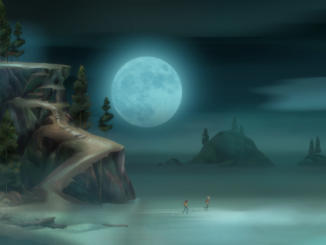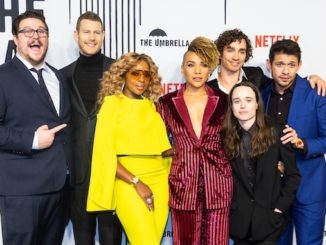So here we are. Less than a month to go in the weirdest election – and election year – the United States has seen in, what, a century? (Shout out to all you Warren G. Harding fans.) Fires burning, a pandemic raging, RBG gone, peaceful protestors under attack, and an incompetent, evil, cruel, lying, cheating, narcissistic odious criminal president stricken by the very virus he has spent a year pretending does not exist.
Writer-director Aaron Sorkin’s excellent new drama/almost-comedy The Trial of the Chicago 7 could not have arrived at a more perfect moment. An indictment of a criminal president (Nixon, not Trump), and his callous disregard for the deaths of tens of thousands of Americans (Vietnam, not COVID-19), it’s also a celebration of those who raised their voices against that criminal presidency, even if their efforts were, at first, met with the blows of a police baton and a racist, callous system embodied by a cranky old white man (in Chicago‘s case, a judge; in 2020’s case, well, y’know).
The Trial of the Chicago 7 may not be an entirely accurate mirror for our time, nor is it an entirely accurate account of what actually happened that summer of ’68, when anti-war demonstrations outside the Democratic National Convention in Chicago were met with a brutal, violent police response. But it’s an important story, well told and well acted, bringing to mind the best of the classic political dramas (All The President’s Men and Good Night and Good Luck both come to mind). Despite a handful of creative liberties – including what appears to be an entirely fictional ending – and a witty, propulsive script that sometimes undermines the seriousness of the topic, it’s one of the best films of this very, very strange year.

THE WHOLE WORLD IS WATCHING
In 1968, a loosely knit network of anti-war and countercultural activists, drawn from the Youth International Party (better known as the Yippies), the National Mobilization Committee to End the War in Vietnam (the MOBE), Students for a Democratic Society (the SDS), and other like-minded groups, descended on Chicago to protest the then-raging Vietnam War. It was a war that would ultimately cost hundreds of thousands of lives, and remains a benchmark against which all other American tragedies are measured. Earlier this year, National Geographic reported that more U.S. citizens had died from COVID-19 than had been killed in combat in Vietnam. That was April 2020. Obviously, that’s since been surpassed and then some.
What happened in Chicago in 1968 will sound painfully familiar. What were initially peaceful and often colourful protests – it was the summer of ’68, and love and hashish were in the air – soon turned violent thanks to the smash-heads-first, ask-questions-later approach of the Chicago P.D. and the U.S. National Guard. Images of the ensuing chaos, in which cops and soldiers rained down blows and fired tear gas and mace on largely peaceful protestors, were carried around the world (and can easily be found on YouTube today). Miraculously, no one was killed, but it was a grim precursor of what was to come only two years later, when Nixon’s goons murdered nine unarmed demonstrators at Kent State.
THE WHOLE WORLD IS WATCHING
The 1968 Chicago DNC took place at a tense moment, with deeply unpopular Democratic President Lyndon Johnson nearing the end of a term marked by civil rights victories but also the increasing folly of the Vietnam War. Still, it’s to Johnson’s credit that his Justice Department refrained from laying any criminal charges against any of the protestors involved in the Chicago events. A year later, however, the election of right-wing demogorgon Richard Nixon brought with it a realigned Justice Department, headed by Attorney General (and future Watergate felon) John Mitchell. In short order, Mitchell instituted a politically motivated prosecution against the supposed ringleaders of the Chicago protests.
This is where The Trial of the Chicago 7 picks up: at the exact moment Nixon is increasing his Southeast Asian terror campaign and conjuring up new and more gruesome ways to slaughter Vietnamese and Cambodian civilians, and at the exact moment when eight of the Chicago “ringleaders” begin their trial on a set of charges including “conspiracy to cross state lines to incite a riot.”
The Trial of the Chicago 7 was always meant to be a spectacle, a kangaroo court to appease the anti-hippie, anti-anti-establishment backlash that had brought Nixon to power. The Trial of the Chicago 7 is a spectacle too: funny, occasionally melodramatic, emotionally powerful. Exactly the type of Hollywoodized version of these events that the Yippies might have frowned upon, yet understood the utility of. What better way to draw attention to a righteous cause than through the medium of cinematic spectacle?
THE WHOLE WORLD IS WATCHING
The Trial of the Chicago 7 had been kicking around Hollywood in various forms for a couple decades – Spielberg was at one point attached to direct – but it’s rather nice to have it land now. And I do mean now, a month shy of an election that will hopefully sweep the Orange Menace from power and maybe, just maybe, restore some sanity to our southern neighbour.
Although Sorkin is the original screenwriter dating from the Spielberg project, I was a bit skeptical of his taking over as director. I like Sorkin, but absent a firmer directorial hand, he can sometimes get too cute, allow himself to get too carried away with one-liners and artificially quippy exchanges. But here, with a perfect cast and the perfect topic, Sorkin gets it right. You can just see him sitting there at his desk, surrounded by West Wing memorabilia, transliterating his righteous anger into a script that lands fast and hard.
It certainly helps that the trial record itself is a gold mine of absurd exchanges and material – some of it darkly funny, some of it just dark – so unbelievable you would swear it’s a Hollywood concoction. I hesitate to spoil any of the best/worst moments, but I will say this: defendants Abbie Hoffman (Sacha Baron Cohen) and Jerry Rubin (Succession’s Jeremy Strong) really did show up in court wearing judge’s robes.
Baron Cohen and Strong almost steal the show as the bearded, long-haired founders of the Yippie movement. The Yippies were the original culture jammers, leveraging the media’s insatiable appetite for the new and the weird to draw attention to important social causes. Prior to the Chicago trial, for example, Jerry Rubin had testified at the House Unamerican Activities Committee (HUAC) in full 18th century Revolutionary regalia. Post-Chicago, his good friend Abbie Hoffman would famously write Steal This Book, a how-to guide on fighting government and corporate oppression – including that of the book chains who refused to stock it, after potential customers kept taking the title literally.
Sorkin, ever the liberal, is kind enough to distribute witty banter and incisive remarks to pretty much all the major cast, not just Baron Cohen and Strong as this film’s stoner Oliver and Hardy. Standouts include Mark “Wolf Hall” Rylance as defence attorney William Kunstler, a sympathetic Joseph Gordon-Levitt as the historically unsympathetic District Attorney Richard Schultz, and, in the villainous role of a lifetime, the legendary Frank Langella as the racist, abrasive, clueless Judge Julius Hoffmann. (End-title text about Hoffman’s real-world reputation confirms that Sorkin/Langella may well have gone too easy on him.)
Eddie Redmayne is also here as future California State Senator Tom Hayden, in a performance that I’m not quite as convinced about. For whatever reason – does Sorkin consider him a sell-out for joining the Democrats he once protested? – Hayden is portrayed here as a weak-willed, mealy-mouthed moderate. Say what you will about Hayden, but at least he didn’t go to Wall Street like a certain long-haired Mr. Rubin.
Rounding out the Seven are John Carroll Lynch as David Dellinger, Alex Sharp as Rennie Davis, Noah Robbins as Lee Weiner, and Daniel Flaherty as John Froines, all of whom get a scene or two and put in fine, if, small performances. Though, oddly, lifelong peace activist Dellinger is omitted in the “where are they now” section at the end of the film.
THE WHOLE WORLD IS WATCHING
If you know your history, you’re probably already shouting at your computer screen that it was originally the Chicago 8, not 7. Rest assured, this is a fact that Sorkin does not overlook.
Originally, prosecutors also charged Black Panther founder Bobby Seale (Yahya Abdul-Mateen II) and placed him on trial alongside the others. The “conspiracy” angle was hard enough to swallow as is, but bringing in the president of the Black Panthers – a group with a different, if intersecting, agenda – just underscored that absurdity. Not to mention, Seale had not been involved in planning the protests, and had only travelled to Chicago at the very last minute, and only then for a short period.
Unlike the presiding judge, Sorkin gives Seale his time in court, devoting a good chunk of the film to the deplorable way with which the Black Panther founder was treated by Judge Hoffmann. Seale’s scenes are easily the most distressing and hard to watch parts of the film. Judge Hoffmann openly treated Seale with contempt, his barely-veiled racism coming through in ways shocking and yet unsurprising. I expect audiences will gasp at a certain scene, which Sorkin actually downplays because the reality was so much worse.
Oh, and fun fact: until Seale’s case was severed from the other seven (his prosecution was later abandoned entirely) he was entirely without legal representation, a sure violation of his civil rights.
THE WHOLE WORLD IS WATCHING
“The whole world is watching!”
So goes the chant that punctuates a grotesque incident of police brutality outside the Conrad Hilton Hotel on August 28, 1968, during the third day of the Chicago DNC. It is a startling – and apparently spontaneous – moment, captured live on TV cameras, and would go on to become a rallying cry for peace movements and activists everywhere. You could hear it at Occupy Wall Street, in demonstrations against the Iraq War, and the phrase has echoed across the past hellish year of police brutality (cue Trump holding a bible).
“The whole world is watching,” goes the chant, which serves as the percussive beat that threads through The Trial of the Chicago 7 (and is used to excellent effect in its trailer).
“The whole world is watching”, explains Abbie Hoffman, in a scene in which he describes the Yippie ethos: if they do not make the most of this moment, of the media spotlight thrust upon them, then their arrest and trial will have been for nothing. The dead of Vietnam will be forgotten.
“The whole world is watching”, warns The Trial of the Chicago 7, in moments so surreally familiar they could easily have been pulled from yesterday’s Twitter feeds, rather than the five-decade-old documentary footage that Sorkin judiciously intersperses within his fictional recreation. Given the production timeline (the film was completed a while ago, but COVID-19 delayed its release), some of the echoes are likely accidental, like the image of an elderly man bleeding from his head after being knocked over by a cop.
THE WHOLE WORLD IS WATCHING
Even before the Trial started, the U.S. National Commission on the Causes and Prevention of Violence had already concluded that the events in Chicago were a “police riot”, characterized by “unrestrained and indiscriminate police violence”. The Commission also noted that, while the demonstrators had occasionally provoked police or responded with violence of their own, “the vast majority of the demonstrators were intent on expressing by peaceful means their dissent.”
The whole world is watching.
The whole world is watching.
The Trial of the Chicago Seven begins streaming on Netflix Canada on October 16, 2020.



